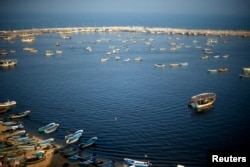Anyone with internet access and a passion for seafood will soon be able to track commercial fishing trawlers all over the world, with a new tool that its developers hope will help end the overfishing that has decimated the world's fish stocks.
Millions of people depend on fish to survive, and fish will be vital to feeding the world's growing population that is predicted to reach 9.7 billion people by 2050, the United Nations says.
But overfishing has diminished fish stocks, and illicit fishing is threatening people's access to food in many poor countries, according to the United Nations.
"We currently have around 450 million people globally who get their primary source of food from the ocean. This is 450 million meals a day under threat," Lasse Gustavsson, executive director of Oceana in Europe, said Wednesday.
"To solve the overfishing problem, including illegal fishing, we want to create transparency in the oceans," Gustavsson told the Thomson Reuters Foundation from Madrid.
Oceana, an international conservation organization, together with Google and SkyTruth, a nonprofit group that uses aerial and satellite images to track changes in the landscape, are due to launch the Global Fishing Tracker within weeks.
The public, non-governmental organizations and local authorities will be able to use it to monitor coastlines and marine conservation areas, follow individual boats in near real-time and track what boats of a particular flag are doing.
It will be especially useful for countries like Madagascar which have few resources to patrol and monitor their own coastlines, Oceana said.
"You can slice that piece of data in many different ways which we think will be helpful when it comes to law enforcement, increasing public understanding, and catching the kind of people who are doing stuff they shouldn't be doing," Gustavsson said.
Some 30 percent of fish stocks were overfished in 2013, up from 10 percent in 1974. Most of the remaining stocks are fully fished, the U.N. Food and Agriculture Organization (FAO) said.
At risk are hundreds of millions of people who depend on fisheries to earn a living, for food and nutrition, according to the FAO.
The industry has vessels operating all over the world — some 15,000 European Union-registered fishing boats work off the coast of West Africa, for example. Although legal, it is unsustainable, according to Oceana.
Fish stocks will quickly bounce back if areas where fish spawn are protected, if fish stocks are managed scientifically, and if destructive and illegal fishing ended, Gustavsson said.
"If we do all the right things now, in 10 years we will have twice as much fish in the ocean globally," he said. "We could increase the number of meals from 450 million a day today to maybe 1 billion."
An international agreement to curb illegal, unregulated and unreported fishing came into force in June.
The Agreement on Port State Measures to Prevent, Deter and Eliminate Illegal, Unreported and Unregulated Fishing allows a country to block ships it suspects of illicit fishing, stopping their catches from entering local and international markets.
It will be a key driver in the international community's fight against illicit fishing, FAO said.






